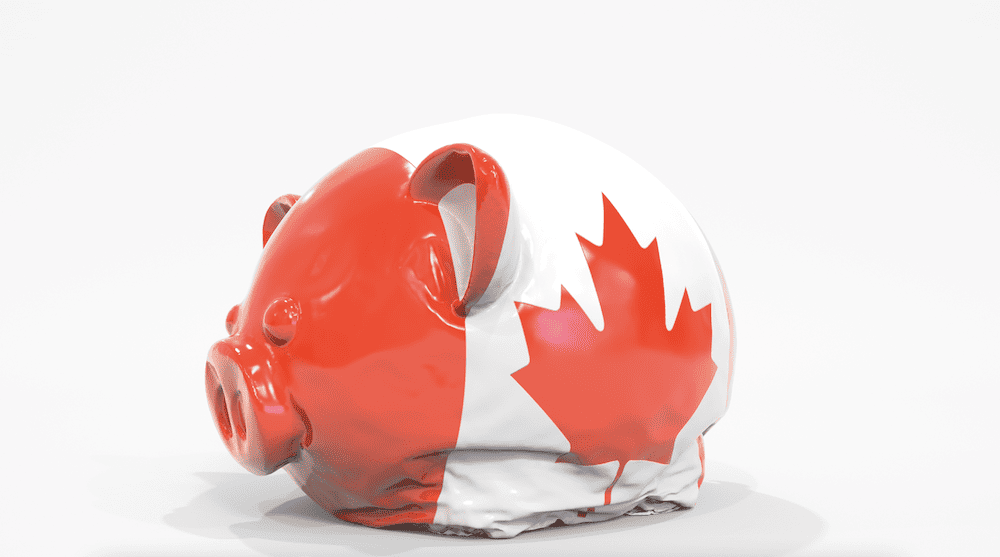Most news reports focused on the positive news that the recession in Canada has been avoided in the last three months of 2023. This is because the economy shrank slightly in the previous quarter (July-September 2023). By definition, two consecutive shrinking quarters would be a recession. However, while Canada technically avoided a recession, many Canadians are still struggling financially. And in this blog we will be taking a deeper dive into the whole situation. As to how recession almost occurred and what are the aftermaths of such close call. Economic downturns or sometimes known as recessions are periods when the economy of a country weakens. This can lead to job losses, decreased sales for businesses, and a decline in the country’s overall production of goods and services. There’s no single rule for when a recession is officially happening, and economists consider many factors to make that call. Periods of economic decline or in common terms Recession, can arise from various triggers. Here’s a closer look at some of the major drivers: Imagine a major unexpected event, like a global pandemic similar to the recent coronavirus outbreak that disrupts economies worldwide. This is an economic shock, a sudden and serious financial disruption. Investment decisions based on euphoria rather than sound analysis can be dangerous. During economic booms, investor optimism can inflate asset prices (like stocks or real estate) to unsustainable levels. These “bubbles” eventually burst, leading to panic selling and a market crash that can trigger a recession. When individuals and businesses borrow heavily, accumulating too much debt, the burden of repayments can become overwhelming. This can lead to defaults and bankruptcies, ultimately causing a significant economic downfall. A prime example is the housing bubble of the mid-2000s, which contributed heavily to the Great Recession in the U.S. A steady rise in prices over time is inflation. While some inflation is normal, uncontrolled inflation becomes dangerous. Central banks try to manage inflation by raising interest rates. Unfortunately, higher interest rates can dampen economic activity and potentially lead to a recession, as seen in the US during the 1970s. The opposite of inflation, deflation occurs when prices consistently decline. This can create a negative feedback loop – falling prices lead to lower wages, further depressing prices due to reduced spending. Japan’s struggles with deflation in the 1990s offer a real-world example of how deflation can cause severe recessions. While central banks have limited tools to combat deflation effectively. Technological advancements, while ultimately beneficial for long-term economic growth, can lead to short-term disruptions. During the Industrial Revolution, rapid technological breakthroughs caused many professions to get obsolete. Causing recessions and economic hardship. Similarly, some economists today worry about artificial intelligence and how automation can potentially eliminate entire job categories, triggering recessions in the future. Understanding these factors that contribute to recessions allows policymakers and individuals to prepare for and mitigate their potential impact.What is a Recession?
What Are Some Factors Causing Recessions?
Sudden Economic Shock
Asset Bubbles
Excessive Debt
Excessive Inflation
Deflation
Technological Change

The Difference Between Recession and Depression
While recessions and depressions share similar origins, depressions bring in far more serious consequences. Imagine a recession as a bump on a road where the economy slows down, but it eventually picks up again. But on the other hand depression, on the other hand is like a deep pothole it causes a much sharper decline that lasts significantly longer.
Here’s a breakdown of the key differences:
- Severity: Depressions see greater job losses, higher unemployment rates, and steeper declines in a country’s overall economic output (Gross Domestic Product or GDP).
- Duration: Recessions are typically shorter, lasting mere months. While depressions can drag on for years.
- Recovery: The road to recovery is much steeper after a depression. It takes a much longer time for the economy to bounce back to a healthy state.
There’s no universally agreed definition for what officially qualifies as a depression. Economists generally categorize depressions by the depth and extended duration of their negative effects.
A great example of economic depression would be the Great Depression of the 1930s. It had a devastating impact on countries around the world including Canada. Where, millions of Canadians lost their jobs, and many faced hunger and homelessness.
Is Recession in Canada Foreseeable?
Economic forecasting is imprecise, but there are warning signs that can signal a possible recession ahead. Here are some key warning signs to watch out for:
- Declining Consumer Confidence: Consumer spending is the backbone of a healthy economy. If surveys consistently show a drop in consumer confidence, it could be a sign of trouble brewing. This means people are feeling less confident about spending money, which can slow down the economy if it translates into actual reduced spending.
- Sudden Stock Market Drops: A sharp and unexpected decline in stock markets can also be a warning sign of an impending recession. Investors may be selling off their stocks in anticipation of an economic slowdown.
- Rising Unemployment: Job losses are a clear indicator of economic weakness. A few months of significant job losses is a strong warning sign of a possible recession, even if it hasn’t been officially declared yet.
How to Prepare For Recession?
Remember 2008? Rough times! Rumours about a recession in Canada is swirling, but don’t panic! As a small business owner, you can prep your company to survive (and thrive!) Let’s get you recession-ready!

Strengthening Your Cash Flow
- Monitor your cash flow closely: Track where your money comes from and goes to. Identify areas where you can reduce expenses without sacrificing quality.
- Collect payments promptly: Take advantage of early payment discounts from suppliers and consider offering them to your customers as well.
- Develop a cash flow plan: This will help you anticipate potential shortfalls and take corrective actions before they become serious.
- Build a financial reserve: Having emergency funds to cover a few months of expenses will provide a safety net during a downturn.
Controlling Costs
- Analyze your expenses: Look for opportunities to cut back, such as negotiating better rates with suppliers or reducing marketing costs.
- Review shipping costs: Explore ways to optimize shipping processes and negotiate better rates with carriers. Intermodal Rail During A Recession is a good alternative to regular shipping.
- Optimize operations: Continually evaluate your business for ways to streamline processes and reduce overhead. Consider technology solutions or alternative work arrangements like remote work or outsourcing.
Expanding Your Reach
- Diversify your customer base: Don’t rely solely on existing customers. Explore new markets or offer new products/services to current customers to reduce reliance on any one market segment.
Leveraging Technology
- Embrace technology: Utilize tools and platforms to streamline operations, enhance customer service, and expand online sales and marketing opportunities. Technology can also facilitate remote work, further reducing overhead costs.
Investing in Your People
- Develop your employees: Investing in employee training and development is a smart long-term strategy. Equip your team with the skills they need to succeed during challenging times.
Seeking Professional Guidance
- Don’t hesitate to seek professional help: Consider working with a financial advisor or marketing consultant to gain valuable expertise and support in navigating a recession.
By taking these steps, you can position your small business for greater resilience during a recession and emerge stronger on the other side.

A recession in Canada was dodged in late 2023, but this close call is a reminder to be recession-ready. While predicting downturns is tricky, watch for warning signs like falling consumer confidence and rising unemployment. Businesses can build resilience by strengthening cash flow, controlling costs, and embracing technology. Remember, recessions are temporary. By staying focused, businesses can emerge stronger on the other side.Conclusion
FAQ’s
What Happens During A Recession?
Recessions can mean more people out of work due to higher unemployment. Goods get cheaper for lower inflation because people buy less. It can also be a bumpy ride for savings and investments.
Who Benefits In A Recession?
Stock market downfall during recessions can actually be a good time for some investors! As when stock prices go down, the money a company pays out to its shareholders becomes a bigger chunk of the overall price. It’s like getting a bigger slice of pie for the same price! This can be good news for investors who are looking for regular income from their investments.
Can I Lose My Money In A Recession?
Economic downturns, or recessions, present a multifaceted threat to personal savings. Lower interest rates, volatile stock markets, and the possibility of job loss can all contribute to a decline in savings. However, implementing strategies such as investment diversification, emergency fund creation, and utilizing high-yield savings accounts can help safeguard your financial well-being during these challenging periods.






